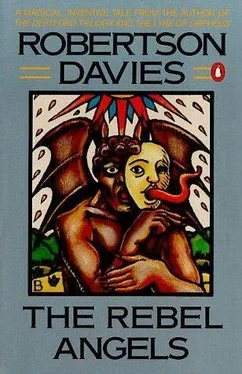Robertson Davies - The Rebel Angels
Здесь есть возможность читать онлайн «Robertson Davies - The Rebel Angels» весь текст электронной книги совершенно бесплатно (целиком полную версию без сокращений). В некоторых случаях можно слушать аудио, скачать через торрент в формате fb2 и присутствует краткое содержание. Жанр: Триллер, на английском языке. Описание произведения, (предисловие) а так же отзывы посетителей доступны на портале библиотеки ЛибКат.
- Название:The Rebel Angels
- Автор:
- Жанр:
- Год:неизвестен
- ISBN:нет данных
- Рейтинг книги:5 / 5. Голосов: 1
-
Избранное:Добавить в избранное
- Отзывы:
-
Ваша оценка:
- 100
- 1
- 2
- 3
- 4
- 5
The Rebel Angels: краткое содержание, описание и аннотация
Предлагаем к чтению аннотацию, описание, краткое содержание или предисловие (зависит от того, что написал сам автор книги «The Rebel Angels»). Если вы не нашли необходимую информацию о книге — напишите в комментариях, мы постараемся отыскать её.
The Rebel Angels — читать онлайн бесплатно полную книгу (весь текст) целиком
Ниже представлен текст книги, разбитый по страницам. Система сохранения места последней прочитанной страницы, позволяет с удобством читать онлайн бесплатно книгу «The Rebel Angels», без необходимости каждый раз заново искать на чём Вы остановились. Поставьте закладку, и сможете в любой момент перейти на страницу, на которой закончили чтение.
Интервал:
Закладка:
Dangerous to make pets of students, I reminded myself. But teaching Maria was like throwing a match into oil, and the others were like wet wood I was trying to blow into something like a fire. I was sorry that Cornish was claiming so much of my energy.
Sorry too because I had become enthusiastic about The New Aubrey. Poor Ellerman's idea had raised a flame in me, and I wanted to fan it.
Just a few random notes about scholarly contemporaries – that was what he had suggested. But where to begin? It is easy to find eccentrics in universities if your notion of an eccentric is simply a fellow with some odd habits. But the true eccentric, the man who stands apart from the fashionable scholarship of his day and who may be the begetter of notable scholarship in the future, is a rarer bird. These are seldom the most popular figures, because they derive their energy from a source not understood by their contemporaries. Hollier, I had cause to believe, was such a man, and I must take advantage of the special opportunity Cornish had given me to study him. But the more spectacular eccentrics, the Species Dingbaticus as I had heard students call them, were attractive to me; I love a mountebank. And in Urquhart McVarish I had been brought close to a very fine mountebank indeed.
Not that he was short on scholarship. As a scholar in Renaissance history he had a good reputation. But he was immodest about it; he is the only man of any respectability in the scholarly world whom I had ever heard refer to himself shamelessly as "a great scholar". He had once been Chairman of the Centre for Renaissance Studies and for a time it seemed as if he would gain it an international reputation. He encouraged able students to work with him, but he would not interest himself in their efforts to stand on their own feet; he used them as skilled assistants, and they saw their chances of achieving the Ph.D. degree vanishing. Taxed with this, Urky replied blithely that anybody who had studied with him could go anywhere in the world and get an academic appointment on that qualification alone. No Ph.D. would be required, and anyhow it was a silly degree which manifest fools were granted every year. To be a McVarish man was a far, far better thing. The students didn't believe it for the best of reasons – because it was untrue. So Urky had to be deposed, and the price was that he be raised to the small, highly paid group of Distinguished Professors, too fine for administrative work. Kicked upstairs.
In a university you cannot get rid of a tenured professor without an unholy row, and though academics love bickering they hate rows. It was widely agreed that the only way to get rid of Urky would be to murder him, and though the Dean may have toyed with that idea, he did not want to be caught. Anyhow, Urky was not a bad scholar. It was simply that he was intolerable, and for some reason that is never accepted as an excuse for getting rid of anybody. So Urky became a Distinguished Professor with light duties, a devoted secretary, and few students.
That did not content him. He took his transformation dourly, and developed what he called an "awfu' scunner" to the University; he ran it down in a jokey style that was all his own to his few favourites, who might also be called toadies, among the students. I heard a few of these scorning Cornish's money bequest to Spook. "A million dollars," they said disdainfully; "what is it when you've invested it, in these days – a couple of mediocre professors, as if we needed any more mediocre professors." It was not hard to tell where that came from. Yes, I really must not fail to capture the essence of Urquhart McVarish.
We were deep in October when Urky asked me to one of his parties. He gave a party every fortnight, usually for students and junior members of faculty, and there had been one famous one at which his hairdresser was the guest of honour; Urky's hair was a quiffed and prinked wonder of silver, and there was a rumour that he wore a hair-net to bed. But I, who had long since had to admit that I possessed not a Shakespearean brow but a substantially bald head, had to be careful that Envy did not trip me up when I thought of that. This party was to include Hollier and myself, and was to have a Cornish flavour.
Indeed it did, for Arthur Cornish was there, the only non-academic present. We assembled pretty promptly at five, for the invitation, in Urky's elegant Italic hand, had said "Sherry – 5 to 7" and our university is great on punctuality. Of course it wasn't sherry only; Scotch and gin were the favourites, but Urky liked the "sherry" business, as being more elegant than cocktails.
The apartment was a handsome one, and contained fine books on expensive shelves, and a few excellent pictures of a generally Renaissance character – Virgins and Saint Johns and a nude who looked rickety enough to be a Cranach but certainly wasn't, and two or three nice pieces of old statuary. Be careful of Envy, I said to myself, because I like fine things, and have some, though not as good as these. There was an excellent bar on what must once have been an ambry in a small church, and a student friend was dispensing generous drinks from it. It was a splendid setting for Urky.
There he was, in the centre of the room, wearing a smoking-jacket or a dinner-jacket or whatever it was, in a beautiful bottle-green silk. Not for Urky, as for lesser Scots, the obvious tartan jacket. He scoffed at tartans as romantic humbug, virtually unheard of until Sir Walter Scott set the Scotch tourist industry on its feet. Urky liked to play the high-born Scot. His Scots speech was high-born too; just a touch of a Highland lilt and a slight roll on some of the r's; no hint of the Robert Burns folk speech.
I was surprised to see Maria there. Urky had her by the arm, showing her a portrait above his mantel of a man in seventeenth-century lace cravat and a green coat the shade our host himself was wearing, whose nose was as long and whose face was as red as Urky's own.
"There you are, my dear, and surely a man after your own heart. My great forebear Sir Thomas Urquhart, first and still unquestionably the best translator of Rabelais. Hello, Simon, do you know Maria Theotoky? Precious on two counts, because she is a great beauty and a female Rabelaisian. They used to say that no decent woman could read Rabelais. Are you decent, Maria? I hope not."
"I haven't read the Urquhart translation," said Maria. "I stick to the French."
"But what you are missing! A great monument of scholarship and seventeenth-century English! And what rich neologisms! Slabberdegullion druggels, lubbardly louts, blockish grutnols, doddipol joltheads, lobdotterels, codshead loobies, ninny-hammer flycatchers, and other suchlike defamatory epithets! How on earth do we get along without them? You must read it! You must allow me to give you a copy. And is it true, Maria dear, that the thighs of a gentlewoman are always cool? Rabelais says so, and I am sure you know why he says it is so, but is it true?"
"I doubt if Rabelais knew much about gentlewomen," said Maria.
"Probably not. But my ancestor did. He was a tremendous swell. Did you know that he is supposed to have died of ecstasy on hearing of the Restoration of his Sacred Majesty King Charles the Second?"
"I might give a guess about what kind of ecstasy it was," said Maria.
"Oho, touche – touche. And for that you deserve a drink and perhaps you will achieve a measure of ecstasy yourself."
Maria turned away to the bar without waiting for Urky to steer her there. A self-possessed young person, clearly, and not impressed by Urky's noisy, lickerish gallantry. I introduced her to Arthur Cornish, who was the stranger in this academic gathering, and he undertook to get her a drink. She asked for Campari. An unusual and rather expensive drink for a student. I took a more careful look at her clothes, although I don't know much about such things.
Читать дальшеИнтервал:
Закладка:
Похожие книги на «The Rebel Angels»
Представляем Вашему вниманию похожие книги на «The Rebel Angels» списком для выбора. Мы отобрали схожую по названию и смыслу литературу в надежде предоставить читателям больше вариантов отыскать новые, интересные, ещё непрочитанные произведения.
Обсуждение, отзывы о книге «The Rebel Angels» и просто собственные мнения читателей. Оставьте ваши комментарии, напишите, что Вы думаете о произведении, его смысле или главных героях. Укажите что конкретно понравилось, а что нет, и почему Вы так считаете.












